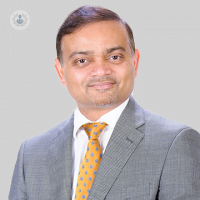Post-ACL reconstruction: Recovery, pain management, and return to activities
Escrito por:In his latest online article, Professor Kuntal Patel gives us his insight into post ACL reconstruction. He talks about the key aspects of post-surgery care, how to effectively manage pain and discomfort and how patients should approach their returning to both physical activities and sports.

What are the key aspects of post-surgery care following an ACL reconstruction?
In most cases, after undergoing a modern surgical procedure, patients typically do not require a knee brace or additional knee support. They can usually begin moving with the help of crutches and put their full weight on the operated leg immediately. It may take a couple of weeks to recover from surgical discomfort and for the swelling to subside. During this time, you may need to keep your leg elevated. You can gradually start bending and straightening your knee to regain mobility. Typically, within two weeks, most patients no longer need crutches. From the second to the sixth week post-surgery, you should aim to rebuild strength in your knee and gradually return to your daily activities. Subsequently, the rehabilitation process, which spans from three to six months, involves intensive physiotherapy to enhance strength, proprioception, and sports-specific recovery.
How can patients effectively manage pain and discomfort during this recovery period?
Over the years, the techniques have advanced significantly. First and foremost, the procedure is now minimally invasive, conducted as a keyhole surgery, resulting in very small incisions that inherently reduce post-operative pain. Additionally, we employ a method of injecting local anaesthetics into the wounds around the knee and within the knee joint, providing several hours of pain relief immediately following the surgery. Most patients are also recommended to use a cryo cuff, a cold cuff placed around the knee in the initial weeks after the surgery. This approach helps to minimise swelling, bruising, and greatly alleviates pain. Furthermore, we implement a structured pain management plan, typically providing pain medication that most patients may require for a couple of weeks. Beyond that, you can transition to simpler pain relief options like paracetamol, anti-inflammatories, and codeine if necessary.
How should patients approach their returning to both physical activities and sport after this reconstruction and what precautions are necessary?
The primary motivation for most patients seeking ACL reconstruction surgery is to regain an active lifestyle, whether it involves recreational sports, amateur activities, or even professional sports. Common sports in which patients aim to resume participation include football, rugby, netball, tennis, badminton, squash, and even skiing, which is frequently inquired about.
The postoperative rehabilitation, as mentioned earlier, plays a crucial role for all patients, regardless of whether they intend to return to high-level sports or not. During the first three to four months, a standard physiotherapy regimen is followed by all patients. After this initial phase, a sports-specific rehabilitation program can be initiated. This phase involves proprioception training and preparation to re-engage in the same level of sports activities as before. The key here is not to rush back into full-time sports immediately. Instead, it's essential to gradually rebuild strength and conditioning over a six-week period before fully returning to sports.
Another important consideration is for those who engage in occasional sports, like an annual skiing holiday. For such cases, it may be beneficial to explore options such as using an ACL knee brace to provide extra support to the knee specifically during skiing. However, for regular sports activities such as football or rugby, once the necessary conditioning and training are complete, you should be able to return to these activities after approximately six months.
Professor Kuntal Patel is a highly esteemed orthopaedic surgeon with over 15 years of experience. You can schedule an appointment with Professor Patel on his Top Doctors profile.


